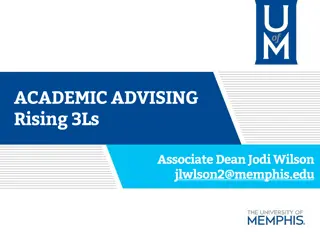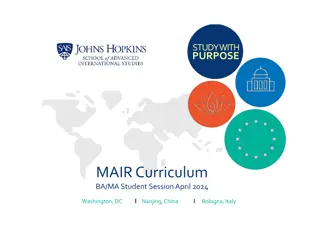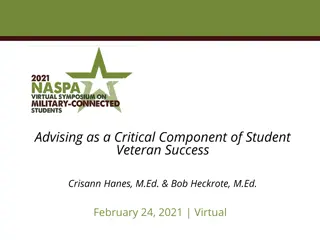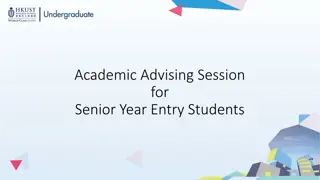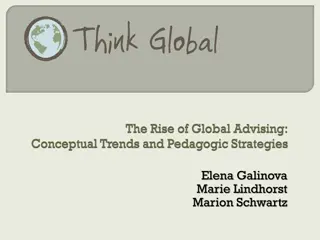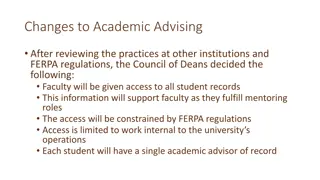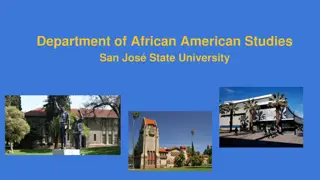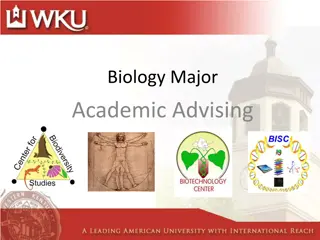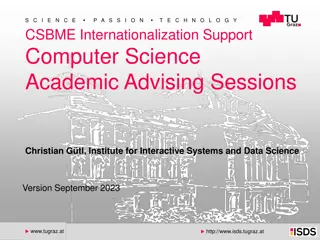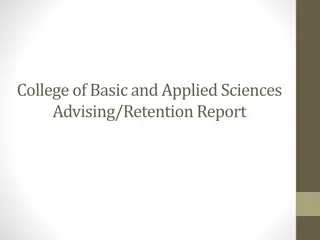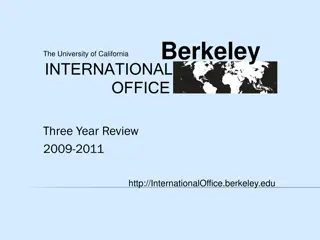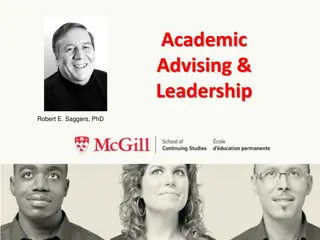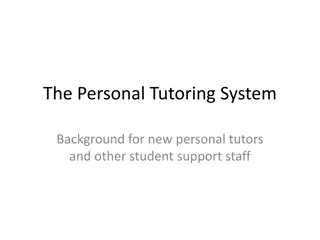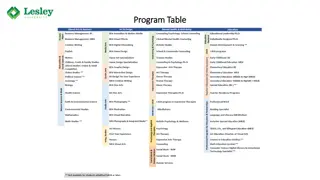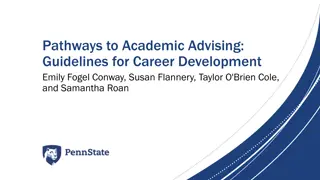Key Roles in Academic Advising
Advisors play a crucial role in connecting with students, understanding their goals, and guiding them towards academic and career success. By fostering relationships and utilizing core competencies, advisors make a significant impact on students' educational experiences.
Download Presentation

Please find below an Image/Link to download the presentation.
The content on the website is provided AS IS for your information and personal use only. It may not be sold, licensed, or shared on other websites without obtaining consent from the author.If you encounter any issues during the download, it is possible that the publisher has removed the file from their server.
You are allowed to download the files provided on this website for personal or commercial use, subject to the condition that they are used lawfully. All files are the property of their respective owners.
The content on the website is provided AS IS for your information and personal use only. It may not be sold, licensed, or shared on other websites without obtaining consent from the author.
E N D
Presentation Transcript
THE NACADA CORE COMPETENCIES Doug Easterly, Ed. D. Dean of Academic Advising, UCSD John Muir College Pronouns: He / Him / His UAAC Meeting, November 2017
SOME ASSUMPTIONS I AM MAKING 1. You have initiative and a desire to improve 2. You either currently kick butt at your job or you want to 3. You are a problem-solver and a relationship-builder 4. You can find colleagues, mentors, and advocates at UCSD who can help you grow and develop as a professional
NACADA? WHATS THAT? NACADA is the National Academic Advising Association, a national professional organization for academic advisors. NACADA promotes and supports quality academic advising in institutions of higher education to enhance the educational development of students. NACADA provides a forum for discussion, debate, and the exchange of ideas pertaining to academic advising through numerous activities and publications. NACADA also serves as an advocate for effective academic advising by providing a Consulting and Speaker Service, an Awards Program, and funding for Research related to academic advising. https://www.nacada.ksu.edu/About-Us.aspx
ADVISING COMPETENCIES The NACADA professional development committee created the model of Academic Advising Core Competencies as a structure for understanding skills needed by advisors, how to structure professional development, how to evaluate advising programs, and to demonstrate our impact on students. I m going to give you an introduction to the competencies and how to use them as a guide for professional development. You can find the competencies at https://www.nacada.ksu.edu/About-Us/NACADA- Leadership/Administrative-Division/Professional-Development- Committee/PDC-Advisor-Competencies.aspx
ADVISING IS LITERALLY GOAL 1 AT UCSD Provide coordinated and comprehensive academic, professional, and career advising across all colleges, departments, and units. Goal 1, Strategy 1 of the UC San Diego Strategic Plan
YOUR KEY ROLES How do advisors affect students lives? Through your relationships. Your first job is to connect with students and help them feel seen, heard, and understood. You can make students academic experiences make sense in terms of their life and career goals.
EFFECTIVE ADVISING REQUIRES COMPETENCIES FROM 3 AREAS Conceptual Informational Relational
THE COMPETENCIES ARE IMPORTANT THOUGH YOUR ROLES MAY DIFFER College Advisors Department and Program Advisors May be one-person shops May have conflicting demands May not have co-curricular supports May have very different types of relationships with students May have lower levels of autonomy and authority May not have infrastructure for training and support Are expected to have a holistic approach Often working with undeclared, transitioning students and students on academic probation May have more chance for long-term relationships May have some autonomy and authority for exceptions May have more infrastructure for training and support
LETS BREAK DOWN THE THREE COMPETENCIES
CONCEPTUAL (UNDERSTANDING) The conceptual component provides the context for the delivery of academic advising. It covers the ideas and theories that advisors must understand to effectively advise their students. History and role of academic advising in higher education NACADA s Core Values of Academic Advising Theory relevant to academic advising Academic advising approaches and strategies Expected outcomes of academic advising How equitable and inclusive environments are created and maintained
INFORMATIONAL (KNOWLEDGE) Institution specific history, mission, vision, values, and culture. The informational component provides the substance of academic advising. It covers the knowledge advisors must gain to be able to guide the students at their institution. Curriculum, degree programs, and other academic requirements & options Institution specific policies, procedures, rules, and regulations Legal guidelines of advising practice, including privacy regulations and confidentiality The characteristics, needs, and experiences of major and emerging student populations Campus and community resources that support student success.
RELATIONAL (SKILLS) The relational component provides the skills that enable academic advisors to convey the concepts and information from the other two components to their advisees. Articulate a personal philosophy of academic advising Create rapport and build academic advising relationships Communicate in an inclusive and respectful manner Plan and conduct successful advising interactions Promote student understanding of the logic and purpose of the curriculum Facilitate problem solving, decision-making, meaning-making, planning and goal setting Engage in ongoing assessment and development
USING THIS MODEL TO DEVELOP AS AN ADVISOR Some quick tips on how to grow using the Core Competencies as a scaffold for your development.
WELL, FIRST OF ALL, ITS A CHECKLIST One of the great things about the Core Competencies Model is that it s basically a 20-item checklist of things to master. The challenge is moving from basic knowledge to integrating the knowledge into your practice, which takes reflection and discussion with peers, including more experienced peers, as well as practice in the field.
DEVELOPMENT RESOURCES NACADA Clearinghouse: http://www.nacada.ksu.edu/Resources/Clearinghouse.aspx Journal: http://www.nacada.ksu.edu/Resources/Journal.aspx Store: http://www.nacada.ksu.edu/Resources/NACADA-Store.aspx Conferences and workshops Consulting On Campus Learning http://www.nacada.ksu.edu/Resources/NACADA-Store.aspx http://www.nacada.ksu.edu/Resources/Journal.aspx http://www.nacada.ksu.edu/Resources/Clearinghouse.aspx https://uc.sumtotal.host/core/dash/home UAAC Training and Development Committee UC Learning Center https://uc.sumtotal.host/core/dash/home Limited e-courses, mostly around active listening In-person courses, usually sponsored by UAAC Development Committee Other Helpful Resources https://uc.sumtotal.host/core/dash/home Counseling and Psych Services Faculty and Staff Assistance Program Campus Partners (Study Abroad, International Students and Scholars, Campus Community Centers, students, etc.) Other professional groups (e.g., NASPA for student affairs, NODA for orientation, NAFSA for international education, etc.)
THAT SAID, YOU SOMETIMES NEED TO MANAGE UP TO CREATE OPPORTUNITIES How to sell it Customize your pitch Your manager envisions themselves as a mentor How will this benefit your unit? Your manager cares, but doesn t manage you closely Your manager doesn t give time or resources for training How will this improve your work? How will this benefit your manager? You have a micromanager
GRASSROOTS TRAINING DEVELOPMENT Expertise Space Release Time Funding
ARTICLES AND LINKS FOR DEVELOPING YOUR CORE COMPETENCIES I m going to breeze through this and then make the slideshow available to you later!
ARTICLES FOR CONCEPTUAL COMPETENCY DEVELOPMENT C1: History & role of academic advising in higher education: http://bit.ly/HistPhilAdv C2: NACADA core values of academic advising: http://bit.ly/NACADACoreValues C3: Theory relevant to academic advising: http://bit.ly/AdvisingTheory C4: Academic advising approaches and strategies: http://bit.ly/AdvisingApproaches C5: Expected outcomes of academic advising: http://bit.ly/AdvLearningOutcomes C6: How equitable & inclusive environments are created & maintained: http://bit.ly/AdvSocialJustice
ADDITIONAL THEORY FOR WORKING WITH DIVERSE STUDENTS Validation: https://link.springer.com/article/10.1007/BF01191156 Belonging: Strayhorn, T. (2012). College students sense of belonging: A key to educational success for all students. New York: Routledge. Advisors as cultural navigators (Strayhorn): http://www.nacadajournal.org/doi/abs/10.12930/NACADA-14-199 Cultural humility: https://muse.jhu.edu/article/268076/summary Equity and Race: Dowd, A. & Bensimon, E. (2015) Engaging the race question : Accountability and equity in U.S. education. New York: Teachers College, Columbia University.
ARTICLES FOR INFORMATIONAL COMPETENCY SELF-DEVELOPMENT I1: Institutional history, mission, vision, values, and culture: http://bit.ly/HistoryofUCSD http://bit.ly/2xlxPVE I2: Curriculum, degree programs, requirements, options: Must be specific to your unit! I3: Policies, procedures, rules, regulations (start with the catalog): http://bit.ly/AcadPolUCSD http://bit.ly/UCSDSenateRegs I4: Legal guidelines: http://bit.ly/AdvLegalIssues http://bit.ly/HighEdPolicy http://bit.ly/UCSD_Confidentiality I5: Characteristics, needs, and experiences of major and emerging student populations: http://bit.ly/AdvStudentPops I6: Campus and community resources that support student success: http://bit.ly/UCSDStudentDiversity http://bit.ly/UCSDTutoringStudybyDept http://bit.ly/UCSDAcadSuccessResources I7: Information technology: http://bit.ly/TechnologyinAdvising
ARTICLES FOR RELATIONAL COMPETENCY SELF-DEVELOPMENT R1: Articulate a personal philosophy of academic advising: http://bit.ly/PersPhilAdv R2: Create rapport & build academic advising relationships: http://bit.ly/AdvisingCommunication R3: Communicate in an inclusive and respectful manner: http://bit.ly/AdvisingCommunication http://bit.ly/AdvSocialJustice R4: Plan and conduct successful advising sessions: Ryan, R. and Woolston, D., (2007), Conducting effective advising sessions: Putting it all together, in Folsom, P. ed., The new advisor guidebook: Mastering the art of advising through the first year and beyond, NACADA, Manhattan, KS, 109- 116 Wicks, J.R. (2017, June). Advising against the clock. Academic Advising Today, 40(2). http://www.nacada.ksu.edu/Resources/Academic-Advising-Today/View-Articles/Advising-Against-the-Clock.aspx R5: Promote student understanding of logic & purpose of the curriculum: http://bit.ly/LearnerCenteredAdvising R6: Facilitate problem-solving, decision-making, meaning-making, goal-setting: http://bit.ly/LearnerCenteredAdvising R7: Engage in ongoing assessment and development: http://bit.ly/AdvAssessment http://bit.ly/AdvProfDev
PROFESSIONAL DEVELOPMENT RESOURCES Work/Life Professional Development resources: http://blink.ucsd.edu/HR/training/career/work-life.html Staff Equal Opportunity Enrichment Program (SEOEP) funds for individuals, departments, and vice chancellor areas: http://blink.ucsd.edu/HR/training/career/SEOEP/index.html#Individual- requirements-and-sel UCSD Staff Associations Scholarships: http://staffassociation.ucsd.edu/scholarships/index.html Internship Initiative: http://blink.ucsd.edu/HR/training/career/CC/initiative/index.html Staff Mentorship Program: http://blink.ucsd.edu/HR/training/career/CC/mentorship/index.html
PROFESSIONAL ORGANIZATIONS NACADA (National Academic Advising Association): https://www.nacada.ksu.edu/Member-Services/Become-a-Member.aspx NASPA (Student Affairs Administrators in Higher Education): https://www.naspa.org/about/membership NODA (National Orientation Directors Association): http://www.nodaweb.org/?page=Membership NAFSA Association of International Educators: http://www.nafsa.org/About_Us/Membership/


